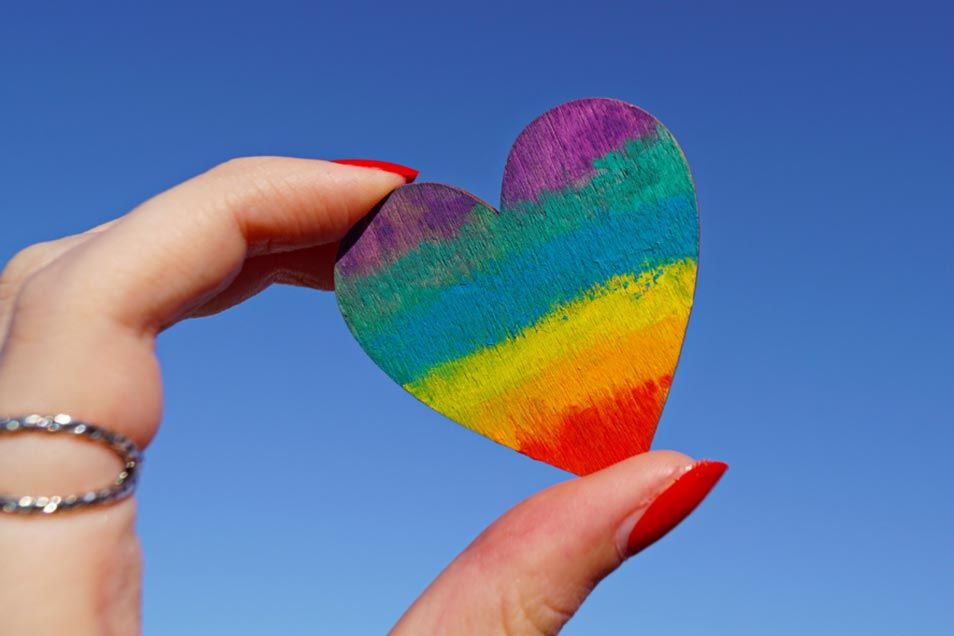June is International Pride Month. The purpose of this commemorative month is to recognize lesbian, gay, bisexual, transgender, and queer (LGBTQ) individuals. This month is also aimed at improving mental health access for marginalized communities and growing awareness of commonly faced issues by the LGBTQ community.
While the community faces mental health challenges like everyone else, LGBTQ members experience mental health issues at higher rates due to the prejudice and discrimination. This article explores how mental health affects LGBTQ members, potential risk factors, and how working with a LGBTQ therapist can help you overcome them.
How Do Mental Health Issues Affect the LGBTQ Community?
- 61% of LGBTQ+ members have depression, 45% have PTSD, and 36% have an anxiety disorder.
- Personal, familial, and social acceptance of sexual orientation and gender identity affects the mental health and personal safety of LGBT individuals.
- LGBTQ+ teens are six times more likely to endure symptoms of depression compared to non-LGBTQ+ identifying teens.
Important Risk Factors of LGBTQI Mental Health
1. Coming out. The general shift in acceptance of LGBTQ has been a positive one. However, this shift has also meant that many LGTBQ youths come out or share their gender identity at a younger age, impacting social and familial relationships. If not taken well, this can negatively influence mental health, especially if not in a supportive environment.
2. Rejection. Coming out is often an incredibly stressful time in someone's life, and unfortunately for many, it can be a traumatic experience. A 2019 survey revealed that 86% of LGBTQ youth have been assaulted or harassed at school after coming out. Coping with the rejection of something as personal as your identity can be difficult, especially from family members and friends.
3. Trauma. Homophobia, transphobia, bullying, and experiencing identity-based shame can be traumatic for people. LGBTQ individuals are some of the most targeted individuals for hate crimes, alongside other types of discrimination that affect the LGBTQ community, including:
- Labeling
- Stereotyping
- Denial of opportunities or access
- Verbal, mental, and physical abuse
All of these factors heighten the risk for PTSD, depression, anxiety, and other related disorders.
4. Substance use. Whether substances are used to self-medicate or as a coping mechanism, addiction and substance misuse are often a concern for members of the LGBTQ community. In fact:
- They’re twice as likely to experience addiction or substance misuse.
- Transgender individuals are about four times as likely to experience a substance use disorder.
- Illicit drug use is significantly higher in high schoolers who identify as LGBTQ or are unsure of their identity.
5. Homelessness. On average, it’s estimated that LGBTQ teens and young adults have a 120% higher risk of experiencing homelessness—which is often the result of family rejection or discrimination. In addition, many community members face challenges in finding homeless shelters that accept them and may experience higher rates of harassment or abuse by others within them.
6. Suicide. Many LGBTQ members struggle in silence—and face unfortunate outcomes as a result.
- The LGBTQ population is more likely to experience suicidal thoughts and attempt suicide.
- LGBTQ high school students, in particular, are four times more likely to have attempted suicide.
- Compared to 5% of the general U.S. population, 40% of transgender adults have had suicidal attempts at some point in their lifetime.
Celebrating Pride Month
Pride is unique because it's a time to celebrate love and acceptance. For many, it's a short break from the daily challenges that many LGBTQ individuals face. At the same time, it's a way to support and encourage those who require additional support and acceptance.
While the dangers that the LGBTQ community faces cannot be ignored, by raising awareness and celebrating pride, individuals have an opportunity to embrace who they are while fighting to protect themselves and others facing similar challenges all over the world.
Finding a LGBTQ-Friendly Therapist Near You
Everybody deserves access to quality mental health care and support to obtain the best outcomes, regardless of gender identity or sexual orientation. While it's normal to feel hesitant or anxious, finding a mental health care professional who understands your personal experiences is the first step towards being the best version of you. Contact us today or call one of our three facilities to learn more and schedule an appointment!
References
https://www.nami.org/Your-Journey/Identity-and-Cultural-Dimensions/LGBTQI
https://www.glsen.org/research/2019-national-school-climate-survey
https://suicidepreventionlifeline.org/wp-content/uploads/2017/07/LGBTQ_MentalHealth_OnePager.pdf
https://www.loc.gov/lgbt-pride-month/about/
https://adaa.org/find-help/by-demographics/lgbtq
https://www.americanprogress.org/issues/lgbtq-rights/reports/2012/03/09/11228/why-the-gay-and-transgender-population-experiences-higher-rates-of-substance-use/
https://www.thetrevorproject.org/resources/preventing-suicide/facts-about-suicide/


